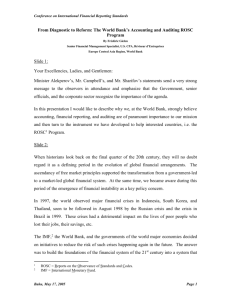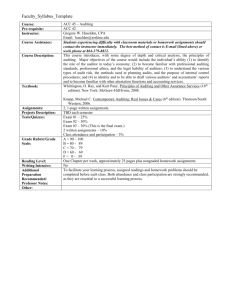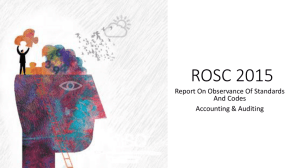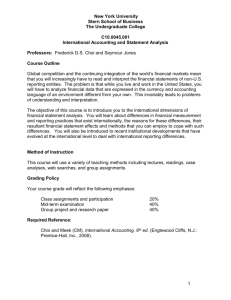Accounting and Auditing ROSC - World Bank Internet Error Page
advertisement
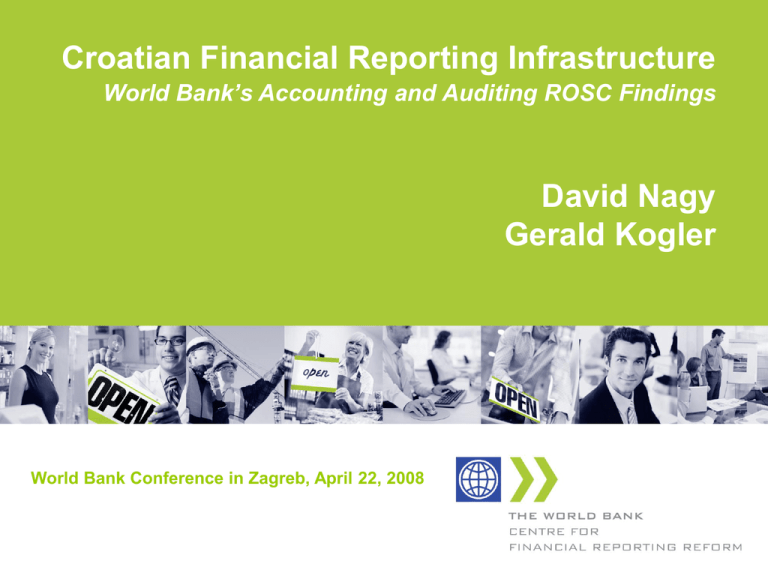
Croatian Financial Reporting Infrastructure World Bank’s Accounting and Auditing ROSC Findings David Nagy Gerald Kogler World Bank Conference in Zagreb, April 22, 2008 Accounting and Auditing ROSC World Bank – Our Role » Making the link between financial reporting and poverty reduction » Advocate for improved standards and compliance » Contributor to the policy formulation process » Assessor » Advisor » Financier » Fiduciary reliance on external audit / use of accountants and auditors to support Bank operations …but not a standard-setter or regulator Accounting and Auditing ROSC 1990 – Emerging Market Crisis and its effects Philippines Malaysia East Asia (Thailand) Hong Kong Indonesia Taiwan South Korea The G-7, World Bank IMF: focus on crisis prevention The Financial Sector Assessment Program (FSAP) The Reports on the Observance of Standards and Codes (ROSCs) Accounting and Auditing ROSC Global Program Europe and Central Asia Middle East and North Africa Latin America and the Caribbean Africa East Asia South Asia Accounting and Auditing ROSC Economic Context Legal & Institutional Framework Accounting in Practice Auditing in Practice FINDINGS Perceptions Factual Assessment Diagnostic Process Recommendations Accounting and Auditing ROSC Benchmarks International Financial Reporting Standards Acquis communautaire International Standards on Auditing Good international practice Accounting and Auditing ROSC Financial reporting A fundamental foundation Insolvency & Creditor Rights Corporate Governance Insurance Supervision Banking Supervision Securities Regulation Accounting & Auditing Accounting and Auditing ROSC ECONOMIC GROWTH Development of Capital Markets Improved Access to Credit Job Creation Private Sector Growth Financial Reporting Financial Sector Development Financial Information Financial Stability Accounting and Auditing ROSC Rapid changes since 2002 » Regulatory framework: new Act on Accounting, new Act on Auditing » Institutional framework: Financial Reporting Council has been established and Chamber of Auditors has been created, non-banking supervision was consolidated into a single institution, the Croatian Financial Services Supervisory Agency (HANFA), Two Stock Exchanges merged » Important policy change, which is to limit the required use of IFRS for the financial statements of all companies by: • a requirement for large, listed companies, and financial sector, • a choice for all other companies between IFRS and accounting standards (to be) issued by the Financial Reporting Council Accounting and Auditing ROSC Additional positive developments » Proactive role of the Ministry of Finance (e.g. IPA “line”) » Croatian Steering Committee on corporate financial reporting established (chaired by MoF) = key counterpart for the A&A ROSC » Support for financial reporting reform by all key stakeholders » Clearance on the A&A ROSC from the MoF » Robust on-site and off-site supervision by the Central Bank » IFRS officially published in the official gazette, as well as available on the internet » Cooperation among key stakeholders (e.g. Memorandum of Understanding between Central Bank and HANFA, forthcoming joint inspections) » Some cooperation with European banking supervisors exists (Austrian FMA) » More students enrolled to study accounting at the University of Zagreb » On-line review of regulatory framework Accounting and Auditing ROSC Space for improvement » Lack of enforcement on the quality of financial statements besides the audit function » No quality assurance on statutory auditors » Lack of enforcement of publication of IFRS financial statements » Not yet finalized consolidation of supervision under HANFA » Disruptive translation of IFRS » Up-to-date translation of IFRS is not publicly available » Ethical standards including independence are outdated » Unclear situation about SME’s » Funding versus voting rights within the Chamber: “Taxation without voting…” » No CPD Program Accounting and Auditing ROSC Financial Sector » Legal requirements for regulatory structure provides room for improvement - Adoption of new published Standards (IASB vs local legislation) - Informal treatment of full compliance with IFRS - CNB does not proactively follow changes and does not adopt supervisory activities » Non-IFRS compliance of certain measurement CNB and HANFA regulations (e.g. unclear audit opinions) » Not readily available appropriate trainings on advanced requirements of reporting related to financial sector Accounting and Auditing ROSC Banking Sector (i) » High quality of IFRS financial statements compared to international peer group » General awareness of IFRS requirements very high » Extensive CNB activities » Senior management involvement in reporting & regulatory issues » No qualified audit opinions » Consistent application of IFRSs » Availability of IFRS financial statements Accounting and Auditing ROSC Banking Sector (ii) » » » » » » » Unclear basis for preparation of financial statements Unconsolidated financial statements Non consistent application of effective interest method Loan loss provisioning not in line with IFRS (CNB-regulation) Unwinding of non-performing loan provisions not in line with IFRS Unclear/missing basis of preparation Uncompleted disclosures on: • financial instruments • Sensitivities • Fair values • Leases • Provisions Accounting and Auditing ROSC Insurance Undertakings » » » » » Unclear basis for preparation of financial statements No IFRS financial statements publicly available for users Unclear requirements of supervision with regards to IFRS Rushed implementation of insurance law Focus on regulatory activities mostly on adequacy of insurance technically provisions » Potentially interference of future regulations with other mandatory requirements (e.g. mandatory formats versus IAS 1 or measurement) » For 2006 financial statements (most likely) no comparables for 2005 Accounting and Auditing ROSC Importance of the financial reporting infrastructure, not just standards Accounting Standards Statutory Framework Monitoring & Enforcement Education & Training Accounting Profession & Ethics Auditing Standards Accounting and Auditing ROSC All supporting pillars need to be strengthened Accounting Standards Statutory Framework Monitoring & Enforcement Education & Training Accounting Profession & Ethics Auditing Standards Accounting and Auditing ROSC Policy Recommendations (i) » Ensure that Croatia mandates the use of up-to-date and complete IFRS » Carefully review existing differences between the Croatian legal framework and the acquis » Remove the requirement for Croatian citizenship to become a licensed statutory auditor » Ensure public availability of full sets of financial statements (including the notes) for public interest entities rather than FINA’s two page summaries of key financial information » Introduce sanctions on the non publication of financial statements by companies » Prepare and adopt accounting standards for SMEs » Establish a continuous and sustainable translation and adoption process for IFRS » Establish a continuous and sustainable translation and adoption process for ISA and the IFAC Code of Ethics Accounting and Auditing ROSC Policy Recommendations (ii) » HANFA should continue to strengthen its institutional capacity to effectively monitor and enforce financial reporting requirements for the entities which it regulates » Ensure public electronic registration of statutory auditors and audit firms within the Chamber of Auditors » Update university curricula and equip universities providing accounting and auditing education with sufficient up-to-date training materials » Facilitate a major training program for prepares, users, auditors and regulators » Establish Continuous Professional Development (CPD) programs for accountants and auditors Thank you - Hvala puno Contact details: dnagy@worldbank.org www.worldbank.org/cfrr www.worldbank.org/eca/hraarosc
